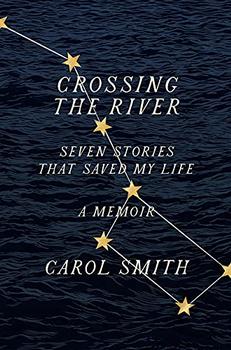Summary | Excerpt | Reading Guide | Reviews | Beyond the Book | Readalikes | Genres & Themes | Author Bio

Seven Stories That Saved My Life, A Memoir
by Carol SmithPROLOGUE
I did not go to my son Christopher's school the day the nurse came to speak. Instead, I lay fetal-like on his bed, my face pressed to his sheets. The trace scents of crayons and Band-Aids, mud and baseball leather, kept me breathing. I squeezed my eyes shut. Images clicked by like a reel in his View-Master:
Christopher, riding a therapy horse, showing off his "tricks," his arms sticking straight out, his head thrown back, laughing. Christopher, hiding rocks and shells under his bed, the found treasures of a seven-year-old.
Christopher, nestled next to me on the bed as we read books together in sign language.
"Again, story," he would sign, tapping the fingertips of one hand into the palm of the other, then drawing his hands apart like he was pulling taffy. I'd laugh, knowing this was a tactic to avoid the dreaded bedtime, and turn back to the beginning.
We'd spied this bed together early one Sunday morning as we wandered the Rose Bowl flea market in Pasadena, California, near where we lived. Both of us had fallen for its vintage pine headboard, festooned with fading decals of saddles and spurs. Sometimes he drifted to sleep in blue pajamas with comets on them, still wearing his red cowboy hat. The bed was his steed and his rocket ship. Now I clung to it for fear of drowning.
It was the first day after winter break, and overcast, the sun locked behind a scrim of gray. Fifteen miles away at George Washington Elementary School in Burbank, my friend Kathy, the mother of one of Christopher's best friends, stood in front of their first-grade class. A pediatric nurse, she'd dealt with young children on cancer wards. Her wide smile and warm voice would have been steady and reassuring.
I could picture her signing as she spoke, by habit as the mother of a deaf child herself, and because many of the children were deaf like Christopher. I'd left my newspaper job in Seattle to move to Pasadena when Christopher was four years old, partly so he could go to this school with its side-by- side teaching in oral and sign traditions. Hearing children in the classroom learned to sign. Deaf children learned to read lips and use their voices. Together, they made a seamless language of childhood. I asked Kathy later to tell me what happened next.
The children fidgeted in their blue-and-red school uniforms as a clutch of adults hovered around the edges of the classroom. They must have thought it strange to see so many grown‑up faces in this space for play and learning. Along with Kathy, their principal was there and a psychologist from the hospital where she worked, as well as the director of the preschool many of the students had attended the previous year, and both their teachers. The teachers' eyes were red from crying. In the middle, Christopher's small wooden desk sat empty.
The therapist—a man the children didn't know—held up a Raggedy Andy doll. Kathy asked the class what they observed about it. The children pointed out his red yarn hair and triangle nose, his sailor hat and embroidered heart. The man put the doll out of sight.
"Even though Raggedy Andy isn't here anymore, can you still remember things about him?" Kathy asked.
The game excited the kids. They shouted out the various adventures of Raggedy Andy and Raggedy Ann from memory. Then one of the adults—Kathy no longer remembers which—stepped forward to break the news. Something very sad had happened. The children quieted. Christopher had gotten sick and wouldn't be coming back to school. Doctors couldn't help him anymore.
"Christopher died." Christopher died. The bed beneath me seemed to pitch and rock. I clutched my knees to my chest to keep from throwing up. I could not grasp the words. Each time I tried, they shattered into piles of indecipherable letters like a child's alphabet puzzle spilled to the floor.
Excerpted from Crossing the River by Carol Smith. Copyright © 2021 by Carol Smith. Excerpted by permission of Abrams Press. All rights reserved. No part of this excerpt may be reproduced or reprinted without permission in writing from the publisher.
Your guide toexceptional books
BookBrowse seeks out and recommends the best in contemporary fiction and nonfiction—books that not only engage and entertain but also deepen our understanding of ourselves and the world around us.